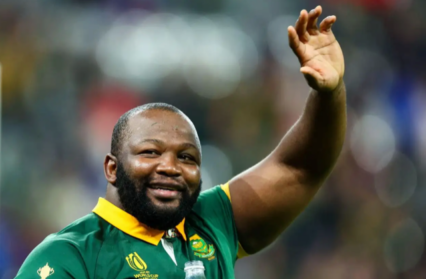Peter Florence continues his Rugby World Cup Diary with a look toward the final game and the crowning of champions.
So that was peak Fazball. Steve Borthwick has been consistent in his faith in his captain, and here, finally, was the full realisation, a strategy built around his star player. Owen Farrell kicked superbly all afternoon, as did his half-back partner, and his back three played their height advantages brilliantly in the air. England grafted with absolute commitment and purpose. It very nearly worked. It failed, ultimately, not because of Farrell’s stealing of the ball that walked the penalty back within kicking distance; nor even because his game management and captaincy were foiled by the impact of the Springboks bench; but just because the game’s moved on. Five kicks, no matter how good, will not beat the world’s top teams today. When you Wilkinson a 50-metre dropped goal in the dying seconds, you can seal the game. When you land it early in the second half, you are flagging that you cannot break the line. It’s a Beta flex. If there is a lesson from the last four years, and especially from the last seven weeks, it is surely that when all defences are so good, to score tries and rack up points, (and to play with flair and elegance) you need to be able to think and counterattack at breath-taking speed, and you need to empower your centres, which you really can’t do if they never touch the ball.
England have fast-tracked an incredibly promising new generation. Martin and Earl and Dan and Lawrence and Mitchell and Smith and Chessum and Arundell and Steward need and deserve a new plan.
Who knows what these Boks can do? They seem to contain all opponents and then trump them. They can play champagne rugby against the most elegant team in the tournament and win with a 50m Handré Pollard penalty in the dying moments of the game, and then they can play abysmally against the least elegant team in the tournament and win with a 50m Handré Pollard penalty in the dying moments of the game. Honestly, it was a dire game, mis-matching the best of England with the worst of South Africa. If they can eke out three minutes of highlights they will probably consist of Owen Farrell’s dropped goal, Rassie Erasmus gesticulating to his bench and a loopy thread of Ox Nché destroying scrums. Nché is 8cm shorter and 8kg lighter than Kyle Sinckler. Vincent Koch also gives up a couple of kilos to Ellis Genge. So you have to figure that, with every penalty they exacted from the English front row at every scrum in in the last 20 minutes of their semi-final, they are simply infinitely superior scrummagers. Those successive penalties turned the match result. But, actually, maybe it’s worth asking: is being stronger and more skilled in your rugby role worth a penalty every time you do your stuff, or should it just be the purpose of your game – like leaping higher and catching, or selling a dummy? England weren’t seeking unfair advantage at the scrums, and if they were endangering their opponents by being weaker, then perhaps it’s the very idea of scrums that is the problem.
If it seemed as if South Africa were dragged down to England’s game plan for 60 minutes, Argentina scarcely interrupted the fluent joy of All Black exuberance in the earlier semi-final. One of the intriguing things about the final is how the Boks will seek to contain the sheer speed of ball. No doubt they’ll have a plan that involves Handré Pollard in the dying moments of the game, but it’s hard to see how they contain the All Blacks, who have pretty much nixed the handling errors that cough up scrums. And even if that changes, their front five have grown resilient throughout the tournament, and Sam Cane is making Peter O’Mahony’s taunt – “you’re just a shit Ritchie McCaw” into the fuel he needed to prove a point to more than just Ireland. It’s just possible that of all the RSA A-list 12s and 13s, Lukhanyo Am and Canan Moodie could match up to Jordie Barrett and Rieko Ioane in midfield, but Aaron Smith passes faster, Richie Mo’unga surges faster, and Will Jordan just moves faster to wherever he needs to be, than anyone they have yet met. New Zealand as a team think faster. And Ardie Savea. Just that. Ardie Savea.
Whoever wins on Saturday night will, unusually, have played all three of the other great sides in the tournament. South Africa have also beaten the fifth and sixth ranked teams, and had a day’s less rest. It could well be that it is not Scotland who have been most disadvantaged by the draw, but the reigning champions.
The 2023 Rugby world Cup has thrown up too many “training ground” victories, a few brutal and ugly ones, and five or six absolute belters. The dramatic arc of the tournament, and the global showcase of the game, needs the two greatest rival rugby nations to deliver a final of spectacular skill and daring and wonder, and, as the game has moved on, that is perhaps the only way to beat either of these sides. At the very crux of the tournament, we’re all faced with the sly reality that it’s not the taking part, nor the winning, but how you play the game that really matters.











